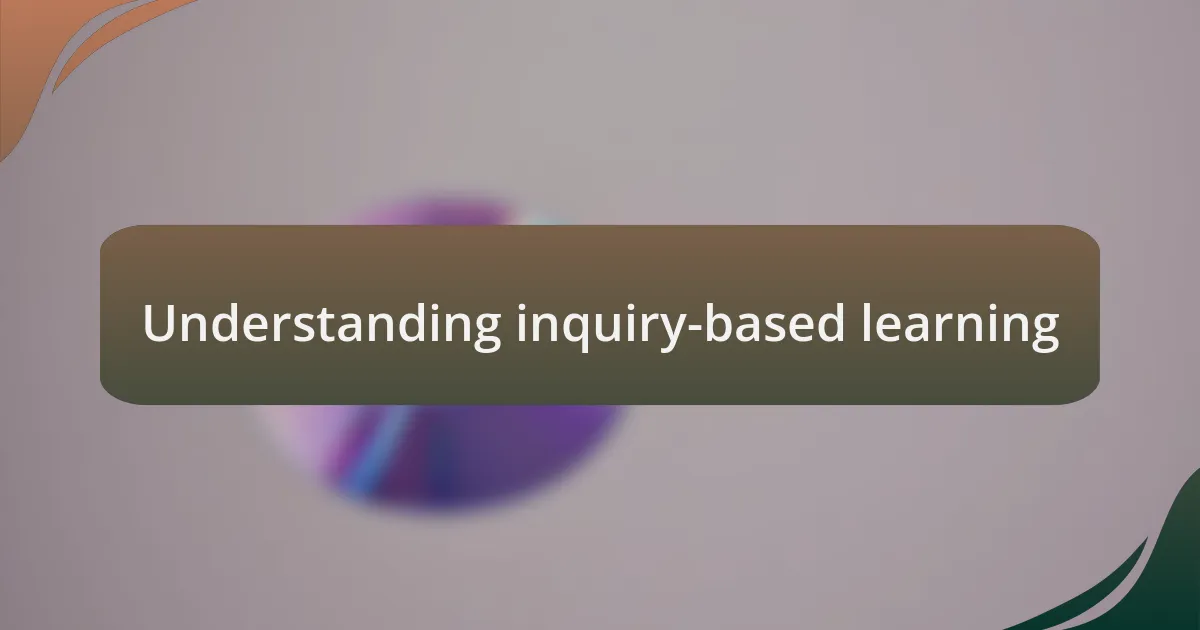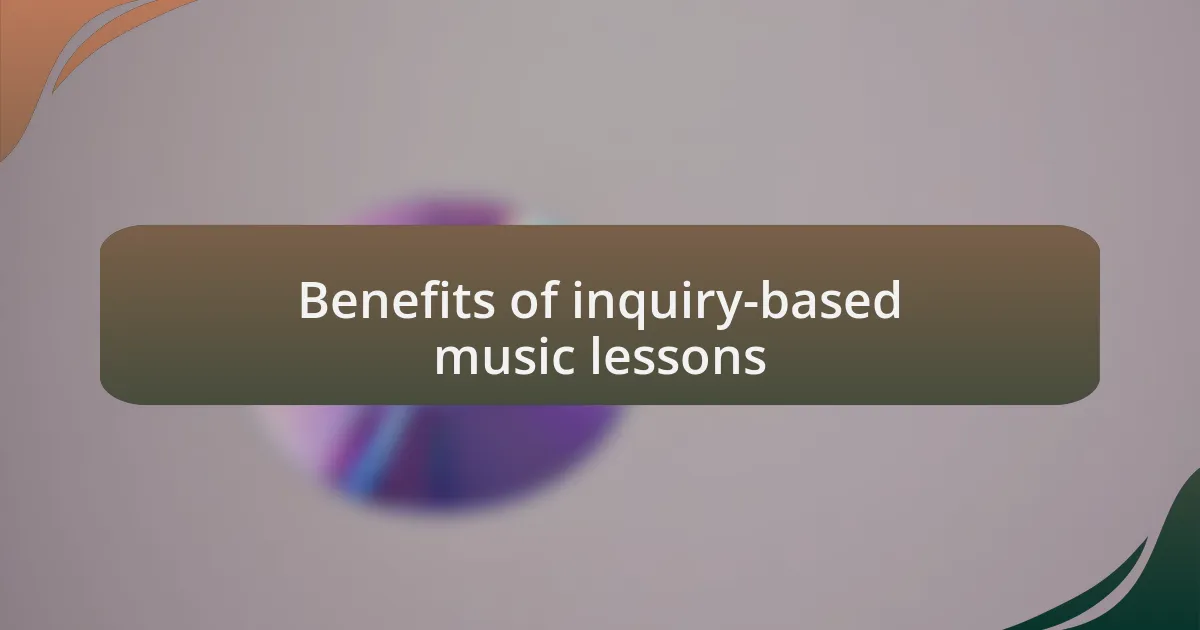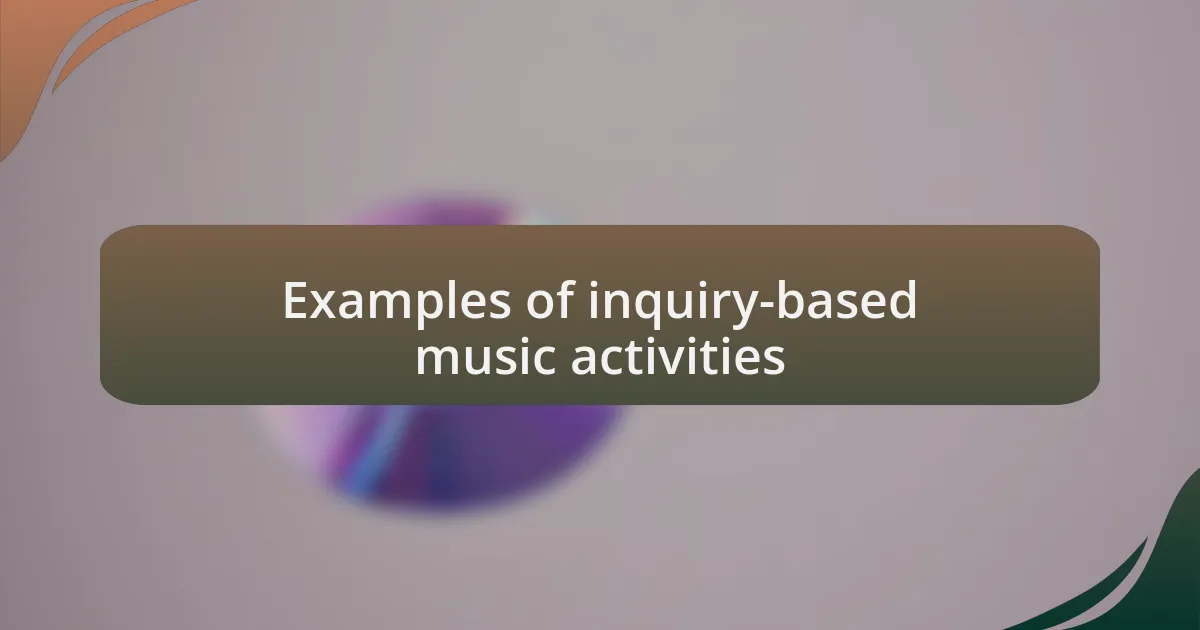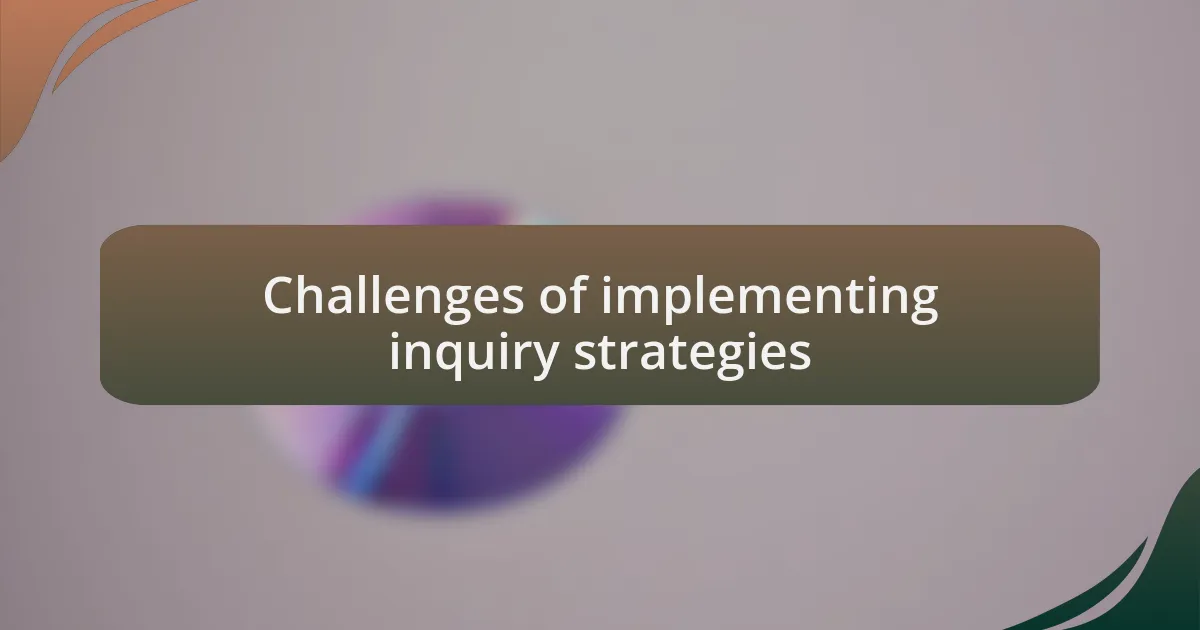Key takeaways:
- Inquiry-based learning enhances student engagement by encouraging them to ask questions and actively explore subjects, fostering deeper connections and critical thinking skills.
- This approach promotes ownership of learning, creativity, and collaborative skills, enabling students to express their musical identities and work effectively in groups.
- Examples of inquiry-based activities, such as musical passports and composition scavenger hunts, illustrate how these methods spark curiosity and enhance musical skills.
- Implementing inquiry strategies can be challenging due to balancing curriculum requirements, time constraints, and varying student comfort with open-ended learning.

Understanding inquiry-based learning
Inquiry-based learning is an educational approach that emphasizes the role of the student as an active participant in their learning process. I find this method incredibly compelling because it encourages learners to ask questions and seek answers, rather than passively absorbing information. Have you ever noticed how a curiosity-driven question can ignite a spark in a student’s engagement?
In my experience, inquiry-based learning fosters a deeper connection to the subject matter. For instance, when I guided a group of music students to explore the roots of jazz through their own research, I saw them dive into the history, culture, and emotion behind the genre. They didn’t just learn about jazz; they felt it, and their performances reflected that newfound passion.
Moreover, this approach cultivates critical thinking skills. As students investigate their questions, they develop the ability to analyze and synthesize information. I often reflect on how this skill is invaluable not just in academics but in everyday life. Isn’t it essential for young musicians to connect theory with practice as they explore their unique musical paths?

Benefits of inquiry-based music lessons
Inquiry-based music lessons offer a chance for students to build ownership over their learning, fostering a sense of agency that can be transformative. During one workshop, I witnessed students choosing their own instruments and genres to explore, leading to collaborations that thrived on their individual interests. It was rewarding to see them surpass their comfort zones, creating original compositions that truly represented who they are as musicians.
One undeniably powerful benefit is the enhancement of creativity. When students are encouraged to explore their musical ideas rather than conforming to traditional methods, the results can be astonishing. I remember a student who initially struggled to improvise; after engaging in an inquiry-based lesson, they surprised everyone by weaving intricate melodies into a blues jam. The thrill that lit up their face showed me that such experiences can unlock latent potential and reinforce their love for music.
Lastly, this approach develops collaborative skills as students often work together on projects. I’ve seen how group inquiries can create bonds among classmates, fostering a community feel in the classroom. It’s fascinating to watch them share insights and critique one another, as those interactions enhance their understanding and appreciation of diverse musical perspectives. Isn’t it inspiring to think that through inquiry-based learning, we’re not just teaching music, but also the essential skills for teamwork in life?

Examples of inquiry-based music activities
One engaging inquiry-based music activity involves creating a “musical passport.” In this exercise, students explore different cultures through their music by researching traditional instruments, styles, and songs. I remember a group of students who stumbled upon a unique drumming style from West Africa; their excitement was palpable as they attempted to recreate the rhythms and discuss the significance behind them, which deepened their appreciation for the music and the culture it represents.
Another effective activity is the “musical inquiry journal,” where students document their thoughts and experiences while learning new concepts. I encouraged my students to reflect on their emotions when listening to various genres. One student expressed how jazz made them feel liberated, leading us to a rich discussion about improvisation and self-expression. This not only helped them find their voice but also connected their personal feelings to the music they created.
Lastly, organizing a “composition scavenger hunt” can spark creativity. I set up a project where students had to find objects around the classroom to inspire sounds and incorporate them into a composition. Their curiosity was infectious, and I vividly recall a student turning a simple pencil into an ethereal soundscape that surprised everyone, including themselves. Activities like these illustrate how inquiry-based approaches not only enhance musical skills but also ignite a sense of wonder and experimentation in every learner.

Challenges of implementing inquiry strategies
Implementing inquiry-based strategies in music education can often feel like navigating a complex maze. One of the biggest challenges I’ve faced is balancing open inquiry with essential curriculum requirements. I remember a project where students proposed to explore the connections between music and environmental sounds. While their enthusiasm was evident, I found myself questioning how to guide them without stifling their creativity or veering too far from our educational standards.
Time constraints pose another significant hurdle. In my experience, fostering a truly immersive inquiry can take longer than the conventional lesson structures allow. There were moments when I watched students dive deep into a topic, only for the bell to ring, ending their exploration prematurely. How do we prioritize these rich discussions within the rigid time frames imposed by school timetables?
Additionally, not every student is comfortable stepping outside the bounds of traditional learning. I once had a group that thrived in structured environments but struggled when encouraged to explore music through improvisation. It made me realize that not all students naturally embrace inquiry; some need explicit guidance and support to feel secure in this open-ended style of learning. How can we cultivate an atmosphere where every student feels safe to experiment, even if it pushes them outside their comfort zone?